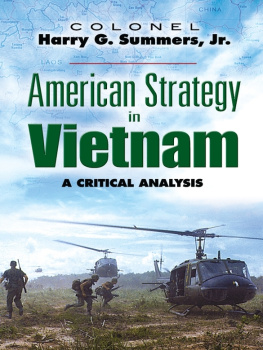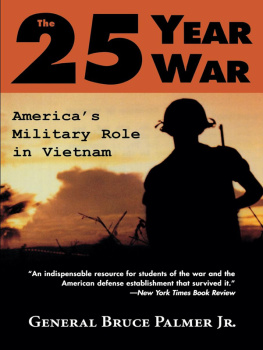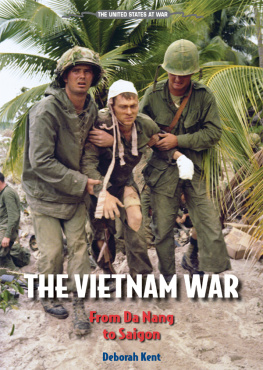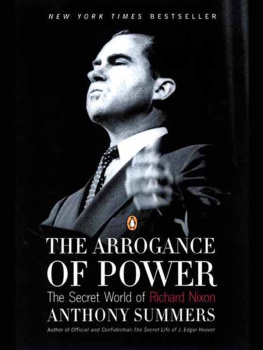Bibliographical Note
This Dover edition, first published in 2007, is an unabridged republication of the fourth printing of On Strategy: The Vietnam War in Context , published by the Strategic Studies Institute, U.S. Army War College, Carlisle Barracks, PA, 1983.
Library of Congress Cataloging-in-Publication Data
Summers, Harry G.
American strategy in Vietnam : a critical analysis / Harry G. Summers, Jr.
p. cm.
Reprint. Originally published: On strategy : the Vietnam War in context.
Strategic Studies Institute, U.S. Army War College: Carlisle Barracks, PA, 1981.
Includes bibliographical references and index.
9780486121550
1. Vietnam War, 19611975United States. 2. Strategy. 3. United States
Military policy. I. Title.
DS558.S86 2007
355.48dc22
2006050789
Manufactured in the United States of America Dover Publications, Inc., 31 East 2nd Street, Mineola, N.Y 11501
To GENERAL WALTER T. KERWIN, JR. (United States Army, Retired) whose deep and abiding concern for the future of the United States Army and the Nation it serves was the original inspiration for this work.
ADAPTED FROM MAP 6, VIETNAM FROM CEASE-FIRE TO CAPITULATION BY COLONEL WILLIAM E. LeGRO, USA. WASHINGTON: US ARMY CENTER OF MILITARY HISTORY, 1981, P. 37.
PREFACE TO THE FOURTH EDITION
This is the fourth Army War College printing of On Strategy since the spring of 1981. On Strategy has revitalized the US Armys interest in the study of strategy and has strengthened our view of the fundamental nature of the relationship between the political and the military. The books widespread use bears witness to its import: The National War College, the Naval War College, the Air War College, and the Marine Corps Amphibious School all use On Strategy as a student text. At Fort Leavenworth, the US Army Command and General Staff College and the Combined Arms and Staff Service School also use it in their curriculum. Moreover, interest in the book is growing in military circles overseas: the Australian Army Staff College has ordered copies for use as a text; the Republic of Mexico is translating the book into Spanish for use by its military personnel; and a Korean translation has been issued to all Korean General Officers. Finally, interest from civilian academic circles has prompted commercial publication by Presidio Press, and the book has been reviewed extensively in the national media. Most recently the work was featured as the January 1983 selection of the Military Book Club.
More than a strategic appraisal of the Vietnam war, On Strategy is a politico-military treatise of rare insight offering practical application of the 19th Century definitive work of Carl von Clausewitz on the nature of war. The author uses our experience in Vietnam to analyze the evolution of strategic and tactical doctrine in the US Army during the 20th Century, with emphasis on the years since World War II. He makes plain the absolute need for a US President to gain the support of the American people before leading the nation into a war and the requirement that such a war also be made the focal point for both the Executive and Legislative Branches. This need for marshalling the national will to fight is something that we in the military tend to overlook; but its essential nature was vividly illustrated during the Vietnam war. The author also stresses the necessity that US governmental leaders responsible for national defense recognize the critical distinction between preparation for and deterrence of war on the one hand, and actual conduct of war on the other.
As it enters its fourth printing, On Strategy continues to make a major contribution to a better understanding of the Vietnam war and a deeper appreciation of strategy and the art of war.
THOMAS F. HEALY
Major General, USA
Commandant
US Army War College
Carlisle Barracks, Pennsylvania
30 November 1983
FOREWORD
At the turn of the century then Secretary of War Elihu Root established the Army War College to, among other things, instruct senior Army officers on the science of war...in all matters pertaining to the application of military science to the national defense and then to present, by written papers and reports...the results of their investigations, explorations, reflections and professional scientific work.
At that time, the major problem at hand was sorting out the debacle of the Spanish-American war, particularly the failures in management, administration and logisticswhat Clausewitz called the art of preparation for war. The War Colleges efforts in this endeavor are reflected in the unparalleled successes in logistics and management which projected and sustained our Army around the globe during the World Wars, Korea and Vietnam.
But, as Clausewitz warned, war preparation is only half of the art and science of war. In Vietnam it appeared that our failings were in the other half of that equationthe conduct of war proper. Once again, the Army War College, in the person of Colonel Harry G. Summers, Jr., was tasked to examine what went wrong. The results of his investigations, explorations, reflections and professional scientific work is the book at hand On Strategy: The. Vietnam War in Context .
It is important for the reader to understand what this book is and what it is not. It is not, nor was it intended to be, a history of the Vietnam war. It is not a detailed account of day-to-day tactical operations or an examination of the many controversies of the war. What was intended was a narrow focus on the war in the area of major concern to the Army War Collegethe application of military science to the national defense. Using Clausewitzian theory and the classic principles of war, the book attempts to place the Vietnam war in domestic context as well as in the context of war itself. Its central thesis is that a lack of appreciation of military theory and military strategyespecially the relationship between military strategy and national policyled to a faulty definition of the nature of the war. The result was the exhaustion of the Army against a secondary guerrilla force and the ultimate failure of military stategy to support the national policy of containment of communist expansion.
As a critical strategic analysis, I believe that this book is firmly on the mark. This conviction is reinforced by the overwhelmingly favorable comments that the War College has received since the book was originally published in the spring of 1981. They came not only from the current leadership of the Army (who, it must be remembered, were captains, majors and colonels during the 1960s, primarily concerned with tactical operations), but also from many retired general officers who were intimately involved in the strategies and plans of the war at the highest level.
The purpose of this analysis was not to find fault or to identify villains but rather, by drawing from the lessons of the past, to prepare todays senior Army officers to meet the challenges that will face our country in the future. By incorporating this book into our course of instruction here at the War College and at the Army
Command and General Staff College at Fort Leavenworth, I believe the Army has taken a major step in improving its ability to implement, through force of arms, the national policies of the United States when called upon to do so.














